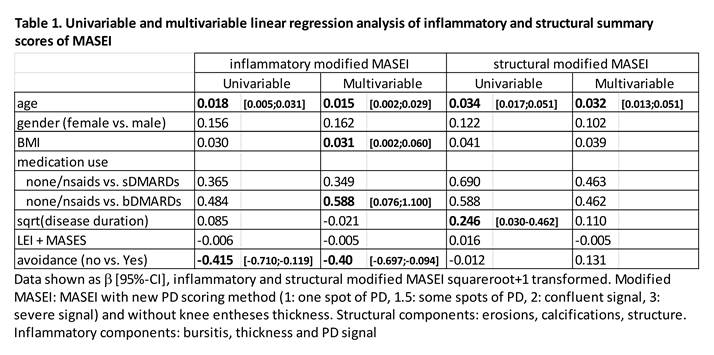Session Information
Date: Monday, November 6, 2017
Title: Spondyloarthropathies and Psoriatic Arthritis – Clinical Aspects and Treatment Poster II
Session Type: ACR Poster Session B
Session Time: 9:00AM-11:00AM
Background/Purpose: Enthesitis is one of the manifestations of psoriatic arthritis (PsA), but no clear definition for the diagnosis exists. To further evaluate the added value of sonographic evaluation of entheses in diagnosing enthesitis, more knowledge on factors associated with sonographic enthesitis is needed. We aim to evaluate which clinical characteristics are associated with sonographic enthesitis changes in a cross-sectional PsA population.
Methods: established PsA patients were asked to participate, irrespective of enthesitis complaints. Patients were interviewed on history of musculoskeletal complaints (MSC), more specifically if they had complaints during activities and whether they avoided physical activities (during exercise, work, household tasks, hobbies, chores). Tenderness was determined in the MASEI entheses and those in the Leeds Enthesitis Index (LEI) and Maastricht Ankylosing Spondylitis Enthesitis Score (MASES). Previously we showed that a modified Madrid Sonographic Enthesitis Index (MASEI, i.e. excluding knee enthesis thickness and scoring PD-signal semi-quantitatively) distinguishes entheses of PsA patients from those of healthy volunteers . A sonographist unaware of clinical findings scored the modified MASEI. Multivariable linear regressions of structural (erosions, calcifications, structure) and inflammatory (thickness, bursitis and PD) modified MASEI scores were performed (transformed for a better distribution). Variables included age, gender, PsA duration, medication use (non/nsaids vs. sDMARDs vs. bDMARDs), LEI + MASES and avoidance (no vs. yes).
Results: 84 PsA patients participated (45 males, mean age 55, median disease duration 8 years). Median modified MASEI was 12 (IQR 7.25-17), with a structural component score of 7 (3-10) and inflammatory component score of 6 (3.5-8.5). 8 patients used no medication or NSAIDs only, 36 used sDMARDs and 40 used bDMARDs. 45 patients reported avoiding activities. In a multivariable analysis, inflammatory modified MASEI was negatively associated with avoidance (i.e. fewer inflammatory changes in patients reporting avoidance) and positively associated with age, BMI and use of biologics. Structural MASEI was positively associated with age only.
Conclusion: Avoiding physical activities is associated with fewer inflammatory changes of the entheses. More inflammatory changes are seen in older or overweight patients and patients on biologicals, in the latter possibly due to more active disease.
To cite this abstract in AMA style:
Wervers K, Herrings I, Luime JJ, Moed M, Tchetverikov I, Gerards AH, Hazes JMW, Vis M. Avoidance of Physical Activity Leads to Reduced Inflammatory Enthesitis on Ultrasound [abstract]. Arthritis Rheumatol. 2017; 69 (suppl 10). https://acrabstracts.org/abstract/avoidance-of-physical-activity-leads-to-reduced-inflammatory-enthesitis-on-ultrasound/. Accessed .« Back to 2017 ACR/ARHP Annual Meeting
ACR Meeting Abstracts - https://acrabstracts.org/abstract/avoidance-of-physical-activity-leads-to-reduced-inflammatory-enthesitis-on-ultrasound/

